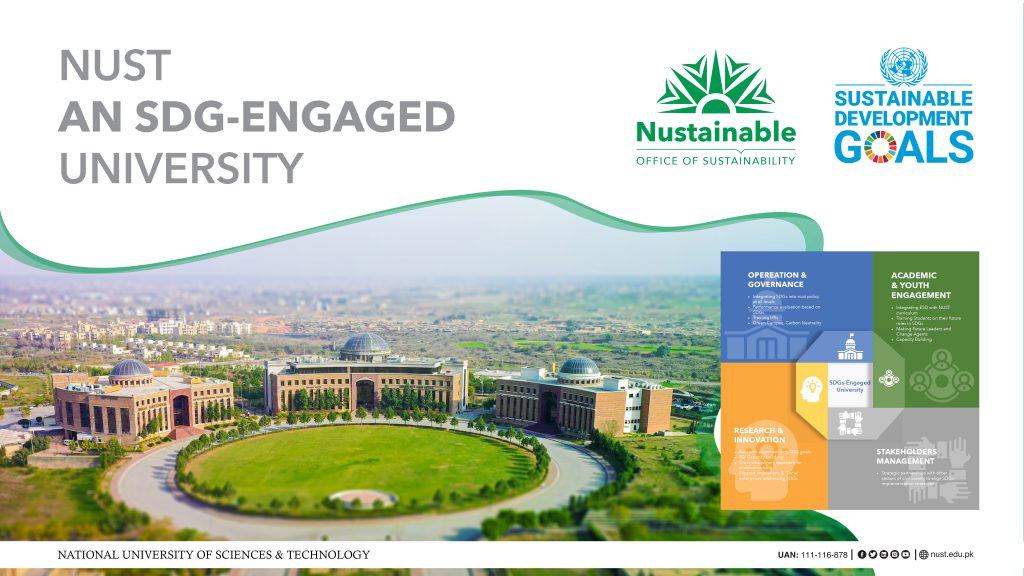Esta web utiliza cookies para que podamos ofrecerte la mejor experiencia de usuario posible. La información de las cookies se almacena en tu navegador y realiza funciones tales como reconocerte cuando vuelves a nuestra web o ayudar a nuestro equipo a comprender qué secciones de la web encuentras más interesantes y útiles.
NUST: An SDG-engaged University
Description
Institution
National University of Sciences and Technology

Organizations/areas of the university involved
National University of Sciences and Technology Campuses
Country
PAKISTAN
Integration of SDGs at National University of Sciences and Technology on strategic level.
SDGs were unanimously signed by 193 countries and Pakistan being initial signatory of UN SDGs, is obliged to meet the SDGs by 2030 and report annually on its progress to the United Nations. Pakistan was the first Parliament to establish Secretariat in Parliament House for SDGs, and a dedicated SDGs Section in Ministry of Planning, Development, and Special Initiatives (MoPDSI), to monitor / coordinate on SDGs nationally. Thus, because of adoption of SDGs as national developmental agenda, and signing of IMF Bailout Program, it becomes an organizational responsibility in Pakistan to achieve the SDGs owing to the national commitment.
NUST Started its SDGs Alignment Initiative in June 2018, and coined the term as becoming SDGs-Engaged University and continue its upward journey towards greater adoption of SDGs in all of core functions. continue our upward journey towards greater adoption of SDGs in all of our core functions. To Collect data we NUST has its own SDGs portal which collects data SDGwise. Next step will be a making NUST as a living lab for the students.
Results and impact measured or expected
• NUST Started its SDGs Alignment Initiative in June 2018, and coined the term as becoming “SDGs-Engaged University” and so far, has achieved remarkable progress in doing so.
• More than 255 KPIs of of SDGs framework pertinent to HEIs were adopted and assigned to 20+ offices and schools of NUST. NUST developed and deployed SDGs Portal, a one of its kind in any university in Pakistan, to track progress and report on these KPIs.
• NUST also participated in 2020 THE Impact Rankings 2020, a ranking by THE on gauging universities impact in achieving the SDGs, across all 17 SDGs and ranked in 200-300 globally, whereas on No. 2 nationally.
• NUST established Office of Sustainability, a first-of-its kind in any university in Pakistan, as per international practices to pledge the organization’s commitment and vision towards sustainability.
Connection with the SDG framework
In order to fulfill that obligation, organizations especially HEIs must make SDGs an integral part of their strategy to assist in achieving the national commitment. Apart from that, following are the key aspects for universities adopting sustainability framework:
a. Universities wishing to transition from 3rd GEN to 4th GEN must adopt a sustainability framework, collaborate, and report on sustainability. b. Various International Rankings based on SDGs to measure a university’s impact which give universities international credibility. c. Universities are adopting Education for Sustainable Development (ESD) curricula as a part of regular courses and reporting on SDGs globally. Universities adopting and reporting on SDGs receive international recognition, credibility, opportunities for collaboration, more networking and funding opportunities (CSR etc.)
Barriers and follow up
Biggest barrier was the community building to overcome this barrier NUST goes for several International Organizations memberships like AASHE, SDSN, ACU , SDGs Accord etc. secondly the mapping of SDGs with the university core functions for this NUST has the hardworking team and also hired Students as an intern.
Transferability of the initiative
Establish effective national and international partnerships, regional and int’l collaborations for sustainable development 2. Sensitizing youth and future leadership on sustainable development and global crisis, and devise capacity building programs through engagement programs, courses, and trainings 3. Improve NUST standing in global rankings of THE Impact and UI Green Metric
Education 4 SDG funciona gracias a WordPress

